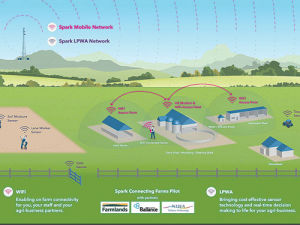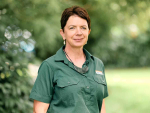The Connecting Farms pilot is a new concept in on farm digital services; the pilot began in April 2017 with 60 farms participating across New Zealand.
Spark is partnering with NIWA, Farmlands, and Ballance Agri-Nutrients to bring this pilot to life for farmers, starting with about 40 farms in the Matamata-Piako region, with a further 20 farms to be added in the South Island.
The pilot will demonstrate how farmers can get real-time information about what is going on all over their farm through an array of sensors connected to Spark’s new, low-power network dedicated to providing connectivity for the ‘Internet of Things’, or IoT. The Internet of Things simply means the connection of many devices or sensors to the internet, and the pilot enables data they collect to be analysed in real time from multiple areas across the farm to support farm decisions.
Connecting Farms will also give farmers better connectivity through improved WiFi capability at their place of work which may be the dairy shed, implement shed or workshop. This allows the pilot farmers to be connected to the internet and trial the on-farm decision tools developed by the partners during the trial. It will also mean that farm suppliers like Ballance Agri-Nutrients, Farmlands and NIWA will be able to use the Wi-Fi network separately when they visit the farm.
Spark’s general manager Smart IoT Solutions, Michael Stribling, says that the Connecting Farms solution will help farmers take advantage of the opportunities of improved connectivity on farm and what the Internet of Things (IoT) offers. This will help the New Zealand agriculture sector capitalise on the huge digital-driven changes that are sweeping the world.
“We’re excited to be working with our partners to put solutions into the hands of farmers, giving them real time information about their farm’s performance,” says Stribling.
Farmlands chief executive Peter Reidie says Connecting Farms is the future of farming in New Zealand.
“Connecting Farms will help farmers in New Zealand make more accurate decisions through live data,” Reidie says. “Our 65,000 farmer shareholders nationwide want better, faster, lower cost solutions and we are enthusiastic about developing the opportunities that can deliver them.”
Ballance chief information officer, Dave Scullin says partnering with Spark Ventures on Connecting Farms is a fantastic opportunity to harness real time information for our customers.


















